No products in the cart.
LI Poet of the Year
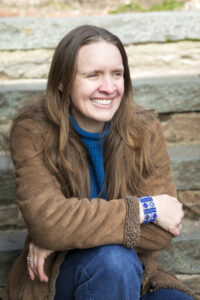 Announcing the 2025 Long Island Poet of the Year – Jesse Curran
Announcing the 2025 Long Island Poet of the Year – Jesse Curran
WWBA’s Trustee Program Committee is proud to announce 2025 Long Island Poet of the Year Jesse Curran.
Born and raised in Huntington, Dr. Jesse Curran is a poet, essayist, scholar, and teacher who currently lives in Northport. Her creative work has appeared in dozens of literary journals including About Place, Blueline, After the Art, Cagibi, and Ruminate. She has also published two chapbooks of poems (Finishing Line, 2019 and 2021) and a lyric novel, A Handful of Earth (Press Pause Press, 2025). Her recent book project, a collection of poems and essays, turns to the North Shore of Long Island and explores the phenomenology of beholding landscape art and practicing landscape ekphrasis as a means of restoring a relationship to place. She teaches in the Department of English at SUNY Old Westbury, where she also directs the Campus Environmental Education Center. www.jesseleecurran.com
The Long Island Poet of the Year Award is an annual award given by Walt Whitman Birthplace Association (WWBA) to honor a notable and distinguished local poet who actively promotes poetry on Long Island. Each year, the board of trustees selects a notable poet as the WWBA poet of the year. They are a nationally known and well-respected poet who champions poetry through their writing, teaching, and support of the Long Island community of poets and their events.
Previous Year’s Long Island Poet of the Year Recipients
Click any name with a green icon below to view bio:
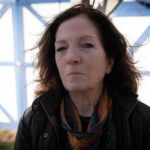
Nancy Keating is co-host of Poetry in the Village reading series for the Babylon Village Arts Council and a Reader for The Southampton Review. She has published two books, The Patron Saints of Knitting, by Finishing Line Press, 2022, and White Chick, from Elixir Press, 2021. Her poetry has appeared in New Letters, Poetry Daily, The Gettysburg Review, The Southampton Review, Southwest Review, as well as several anthologies. A three- time Pushcart Prize nominee, she has an MFA from Stony Brook University and teaches at Farmingdale State College.
The Long Island Poet of the Year Award is an annual award given by Walt Whitman Birthplace Association (WWBA) to honor a notable and distinguished local poet who actively promotes poetry on Long Island. Each year, the board of trustees selects a notable poet as the WWBA poet of the year. They are a nationally known and well-respected poet who champions poetry through their writing, teaching, and support of the Long Island community of poets and their events
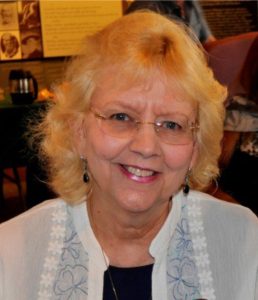 Paula Camacho, as President of the Nassau County Poet Laureate Society, serves the poetry community in countless ways by encouraging discovery of the poetic voice, elevating appreciation for the written word and enriching the lives of local poets through events, contests, anthologies, scholarships and more. She is a breast cancer survivor and participated in various poetry organizations over the years. Paula moderated the Farmingdale Poetry Group for 20 years to empower and evolve the poetic skills, artistry form and creativity of participants. She taught a poetry class, You Can Write Poetry, in the Adult Education program at the Farmingdale High School. Paula also served on the Nassau Council for the Arts for three years. Her poetry has won various awards, including the Alice Abel National Literary Contest. She has published nine collections of poetry. Her latest collection, Transmutation, is a 2021 finalist in the Blue Light Poetry Prize. Paula holds degrees in Nursing and Theology and lives with her family in Farmingdale.
Paula Camacho, as President of the Nassau County Poet Laureate Society, serves the poetry community in countless ways by encouraging discovery of the poetic voice, elevating appreciation for the written word and enriching the lives of local poets through events, contests, anthologies, scholarships and more. She is a breast cancer survivor and participated in various poetry organizations over the years. Paula moderated the Farmingdale Poetry Group for 20 years to empower and evolve the poetic skills, artistry form and creativity of participants. She taught a poetry class, You Can Write Poetry, in the Adult Education program at the Farmingdale High School. Paula also served on the Nassau Council for the Arts for three years. Her poetry has won various awards, including the Alice Abel National Literary Contest. She has published nine collections of poetry. Her latest collection, Transmutation, is a 2021 finalist in the Blue Light Poetry Prize. Paula holds degrees in Nursing and Theology and lives with her family in Farmingdale.
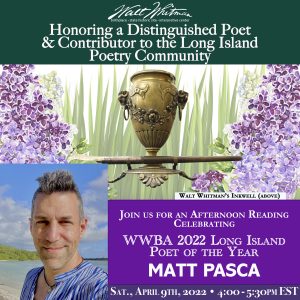 MATT PASCA is a poet, teacher and traveler who believes in art’s ability to foster discovery, empathy and justice. He has authored two poetry collections—A Thousand Doors (2011 Pushcart nominee) and Raven Wire (2017 Eric Hoffer Book Award Finalist)—and was named 2022 Long Island Poet of the Year by the Walt Whitman Birthplace Association. Matt serves as Assistant Poetry Editor of 2 Bridges Review and as adviser to The Writers’ Block, thrice awarded “Most Outstanding High School Literary-Art Magazine” by the American Scholastic Press Association. A 2003 New York State Teacher of Excellence, Pasca has taught Poetry, Mythology, and IB English at Bay Shore High School for 25 years. He is currently at work on his third poetry collection, entitled Traitor. www.mattpasca.com
MATT PASCA is a poet, teacher and traveler who believes in art’s ability to foster discovery, empathy and justice. He has authored two poetry collections—A Thousand Doors (2011 Pushcart nominee) and Raven Wire (2017 Eric Hoffer Book Award Finalist)—and was named 2022 Long Island Poet of the Year by the Walt Whitman Birthplace Association. Matt serves as Assistant Poetry Editor of 2 Bridges Review and as adviser to The Writers’ Block, thrice awarded “Most Outstanding High School Literary-Art Magazine” by the American Scholastic Press Association. A 2003 New York State Teacher of Excellence, Pasca has taught Poetry, Mythology, and IB English at Bay Shore High School for 25 years. He is currently at work on his third poetry collection, entitled Traitor. www.mattpasca.com
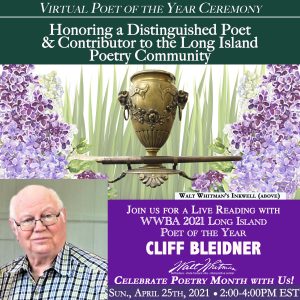 Cliff Bleidner writes haiku poetry and has received recognition among local writers as a distinguished poet and organizer in the Long island poetry community. He was a cofounder and coordinator of the Performance Poets Association (PPA), Long Island’s largest poetry organization. He also manages the annual PPA poetry contest, now in its 25th year. He has co-hosted PPA poetry events at more than a dozen different locations across Long Island. Due to his dedication for the PPA, it has been a successful outlet for many Long Island poets. Cliff also assembles the PPA Literary Review manuscript from the judge’s decisions of submissions; the most recent publication in 2020, its 24th consecutive year. Cliff Bleidner has presented lectures on Dante and has held Haiku workshops and formalist poet seminars. Cliff’s poems have been published in: 24 issues of the PPA Literary Review, The Haiku Calendar, Long Island Sounds, Paumanok I: Poems and Pictures of Long island, Paumanok II: Interwove and Writing Outside the Lines, among many others.
Cliff Bleidner writes haiku poetry and has received recognition among local writers as a distinguished poet and organizer in the Long island poetry community. He was a cofounder and coordinator of the Performance Poets Association (PPA), Long Island’s largest poetry organization. He also manages the annual PPA poetry contest, now in its 25th year. He has co-hosted PPA poetry events at more than a dozen different locations across Long Island. Due to his dedication for the PPA, it has been a successful outlet for many Long Island poets. Cliff also assembles the PPA Literary Review manuscript from the judge’s decisions of submissions; the most recent publication in 2020, its 24th consecutive year. Cliff Bleidner has presented lectures on Dante and has held Haiku workshops and formalist poet seminars. Cliff’s poems have been published in: 24 issues of the PPA Literary Review, The Haiku Calendar, Long Island Sounds, Paumanok I: Poems and Pictures of Long island, Paumanok II: Interwove and Writing Outside the Lines, among many others.
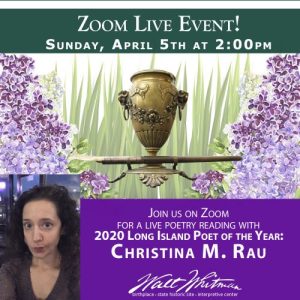 Christina M. Rau is the author of the Elgin Award winning sci-fi fem poetry collection Liberating The Astronauts (Aqueduct Press, 2017), the chapbooks WakeBreatheMove (Finishing Line Press, 2015), and For The Girls, I (dancing girl press, 2014). She is Oceanside Library (NY)’s Poet-in-Residence for 2020, and she is the founder of Poets In Nassau, a reading circuit on Long Island, NY. She teaches English and Creative Writing at Nassau Community College where she also serves as Editor-in-Chief for The Nassau Review. Her poetry has appeared on gallery walls in The Ekphrastic Poster Show, on car magnets for The Living Poetry Project, and in various journals both online and in print while her prose frequently appears on Book Riot. She also has conducted poetry readings and workshops nationwide. In her non-writing life, when she’s not teaching yoga, she’s watching the Game Show Network. http://www.christinamrau.com
Christina M. Rau is the author of the Elgin Award winning sci-fi fem poetry collection Liberating The Astronauts (Aqueduct Press, 2017), the chapbooks WakeBreatheMove (Finishing Line Press, 2015), and For The Girls, I (dancing girl press, 2014). She is Oceanside Library (NY)’s Poet-in-Residence for 2020, and she is the founder of Poets In Nassau, a reading circuit on Long Island, NY. She teaches English and Creative Writing at Nassau Community College where she also serves as Editor-in-Chief for The Nassau Review. Her poetry has appeared on gallery walls in The Ekphrastic Poster Show, on car magnets for The Living Poetry Project, and in various journals both online and in print while her prose frequently appears on Book Riot. She also has conducted poetry readings and workshops nationwide. In her non-writing life, when she’s not teaching yoga, she’s watching the Game Show Network. http://www.christinamrau.com
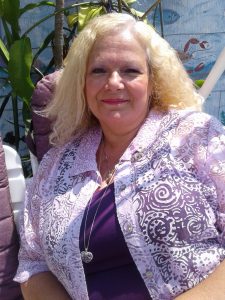 J. R. Turek is an internationally published poet, editor, and workshop leader. She has been the recipient of two Pushcart nominations and Proclamations for her dedication to Poetry from Nassau County, Suffolk County, the New York State Senate, and the New York State Assembly. Turek was named Bards Laureate from 2013–2015, NYS Woman of Distinction in 2017, and Winner of the Village of Great Neck Poetry Contest in 2018. J. R. is a Council Member for The Bards Initiative, host for Performance Poets Association, and Board Member for The North Sea Poetry Scene (TNSPS), Princess Ronkonkoma Productions (PRP), and Performance Poets Association (PPA). She has been editor of The Bards Initiative’s Annual Anthology, co-editor of Whispers and Shouts, Max Wheat’s Young Voices Children’s Anthology, and Moderator of the Creative Writing Group in Farmingdale for 22 years. J. R. Turek is the author of four full-length poetry collections: A is for Almost Anything, Imagistics, They Come And They Go, and B is for Betwixt and Between. Her work has been translated into Korean, Romanian, French, and Italian. J. R., the Purple Poet, is a lifetime Long Islander who resides in East Meadow with her soulmate husband, her dogs, and her extraordinarily extensive shoe collection. She has been a “poem-a-dayer” for over 15 years.
J. R. Turek is an internationally published poet, editor, and workshop leader. She has been the recipient of two Pushcart nominations and Proclamations for her dedication to Poetry from Nassau County, Suffolk County, the New York State Senate, and the New York State Assembly. Turek was named Bards Laureate from 2013–2015, NYS Woman of Distinction in 2017, and Winner of the Village of Great Neck Poetry Contest in 2018. J. R. is a Council Member for The Bards Initiative, host for Performance Poets Association, and Board Member for The North Sea Poetry Scene (TNSPS), Princess Ronkonkoma Productions (PRP), and Performance Poets Association (PPA). She has been editor of The Bards Initiative’s Annual Anthology, co-editor of Whispers and Shouts, Max Wheat’s Young Voices Children’s Anthology, and Moderator of the Creative Writing Group in Farmingdale for 22 years. J. R. Turek is the author of four full-length poetry collections: A is for Almost Anything, Imagistics, They Come And They Go, and B is for Betwixt and Between. Her work has been translated into Korean, Romanian, French, and Italian. J. R., the Purple Poet, is a lifetime Long Islander who resides in East Meadow with her soulmate husband, her dogs, and her extraordinarily extensive shoe collection. She has been a “poem-a-dayer” for over 15 years.
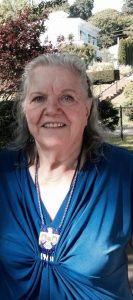 Barbara Reiher-Meyers is a Long Island poet who has edited several volumes of poetry and whose work has been published in print journals and online. Sounds Familiar is the title of her first book of poems. A former board member of the Long Island Poetry Collective, Barbara has hosted the Open Mic at the Conklin Barn in Huntington, NY for many years. She also curated a poetry calendar for www.poetz.com/longisland, and coordinated events for the Northport Arts Coalition and Smithtown Township Arts Council, among others. Barbara has facilitated monthly workshops in Ronkonkoma, and sends weekly emails about Long Island and New York City poetry events. Anthologies: Long Island Sounds Anthology (North Sea Poetry Scene Press, 2007), Long Island Sounds Anthology (North Sea Poetry Scene Press, 2008), Paumanok: Poetry and Pictures of Long Island (Cross-Cultural Communications, 2008), The Light of City and Sea (Street Press, 2006) Journals: American Dissident, Long Island Quarterly, Mobius, Pedestal Magazine
Barbara Reiher-Meyers is a Long Island poet who has edited several volumes of poetry and whose work has been published in print journals and online. Sounds Familiar is the title of her first book of poems. A former board member of the Long Island Poetry Collective, Barbara has hosted the Open Mic at the Conklin Barn in Huntington, NY for many years. She also curated a poetry calendar for www.poetz.com/longisland, and coordinated events for the Northport Arts Coalition and Smithtown Township Arts Council, among others. Barbara has facilitated monthly workshops in Ronkonkoma, and sends weekly emails about Long Island and New York City poetry events. Anthologies: Long Island Sounds Anthology (North Sea Poetry Scene Press, 2007), Long Island Sounds Anthology (North Sea Poetry Scene Press, 2008), Paumanok: Poetry and Pictures of Long Island (Cross-Cultural Communications, 2008), The Light of City and Sea (Street Press, 2006) Journals: American Dissident, Long Island Quarterly, Mobius, Pedestal Magazine
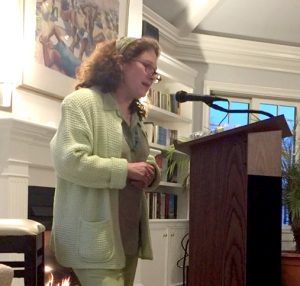 Tammy Jean Nuzzo-Morgan was the 2009–2011 Suffolk County Poet Laureate, the founder of The North Sea Poetry Scene, Inc. She first studied Accounting/Business Administration throughout her undergraduate career and later received an MBA from Long Island University. Eventually, she shifted to the arts and received her MFA from Stony Brook University – Southampton. She is currently a PhD student at Union Institute & University and has been teaching at Briarcliffe College since 2010. She is the author of five poetry collections: The Bitter, The Sweet (Southampton: North Sea Poetry Scene, 2004); One Woman’s Voice (Sound Beach: Street, 2005); Let Me Tell You Something (Sound Beach: Street, 2006); For Michael (Southampton: North Sea Poetry Scene, 2008); and Life’s a Beach (Selden: Writers Ink, 2011). She is the editor of the anthology series, Long Island Sounds (Southampton: North Sea Poetry Scene, 2005, 2006, 2007, 2008, 2009, 2015), which is now in its sixth volume. Her work has been published in many books, websites, anthologies, and journals. Nuzzo-Morgan has been awarded the Mobius’ Editor-in-Chief Choice Award and the LIWG Community Service Award.
Tammy Jean Nuzzo-Morgan was the 2009–2011 Suffolk County Poet Laureate, the founder of The North Sea Poetry Scene, Inc. She first studied Accounting/Business Administration throughout her undergraduate career and later received an MBA from Long Island University. Eventually, she shifted to the arts and received her MFA from Stony Brook University – Southampton. She is currently a PhD student at Union Institute & University and has been teaching at Briarcliffe College since 2010. She is the author of five poetry collections: The Bitter, The Sweet (Southampton: North Sea Poetry Scene, 2004); One Woman’s Voice (Sound Beach: Street, 2005); Let Me Tell You Something (Sound Beach: Street, 2006); For Michael (Southampton: North Sea Poetry Scene, 2008); and Life’s a Beach (Selden: Writers Ink, 2011). She is the editor of the anthology series, Long Island Sounds (Southampton: North Sea Poetry Scene, 2005, 2006, 2007, 2008, 2009, 2015), which is now in its sixth volume. Her work has been published in many books, websites, anthologies, and journals. Nuzzo-Morgan has been awarded the Mobius’ Editor-in-Chief Choice Award and the LIWG Community Service Award.
An award ceremony and poetry reading by Tammy Nuzzo-Morgan was held on Sunday, April 23rd, from 2-4 PM. The program is free and open to the public.
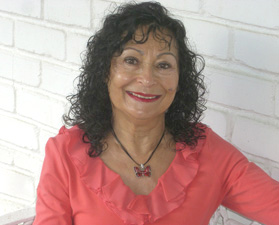 Nassau County Poet Laureate for 2009–2011, Gayl Teller received an MA from Columbia University and another MA from Queens College, CUNY. Her six poetry collections are At the Intersection of Everything You Have Ever Loved (San Diego Poets Press, 1989); Shorehaven (Mellen Poetry Press, 1996); Moving Day (Providence, RI: Premier Poets Series, 2001); One Small Kindness (Austin, TX: Plain View Press, 2003); Inside the Embrace (WordTech/ Cherry Grove,2010); and most recently, Hidden in Plainview (WordTech/Cherry Grove, 2015). She is the editor of Toward Forgiveness, an anthology of poems (Writers Ink Press, 2011). Internationally and widely published, her poems have appeared in Poem, The South Coast Poetry Journal, Phoebe, The Sow’s Ear Poetry Journal, Paterson Literary Journal, Freshet, Poetrybay: Long Island Quarterly, Spring, Swansea Review, The Second Genesis, Newsday, The Long Islander: Walt’s Corner, The Hartford Courant, and in many other distinguished publications. Director and founder of the Poetry Reading Series, under the auspices of the New York State Council on the Arts, at the Mid-Island Y JCC, in Plainview, NY, for the past twenty years, she reviews the works of feature poets and judges the annual poetry contest for children, teens, and adults. She has been teaching in the English department of Hofstra University since 1985. As Nassau County Poet Laureate, she originated “Stray Feet,” a roving poetry show visiting schools, senior and rehab centers, nursing homes, and libraries in Nassau County. In 2010 her workshops/anthology project “A Poetry of Forgiveness” was awarded a New York State Council on the Arts Decentralization Grant for the Arts, which culminated in her editing Toward Forgiveness, an anthology of 99 LI poets, including five poets laureate, published by Writers Ink Press, in 2011. She has conducted numerous poetry workshops and seminars and been the feature reader at many universities, poetry centers, theaters, and libraries. She has served as a judge in the Poetry Out Loud National Recitation Contest, which encourages the nation’s youth to learn about great poetry through memorization and performance. She is the recipient of the Westmoreland Arts & Heritage Festival Poetry Award, the Edgar Allan Poe Prize, the Peninsula Library Poetry Prize, a National Federation of State Poetry Societies Prize, a National League of American PEN Women Prize, and The Connecticut Writer Prize; and her poem One Small Kindness was a finalist for the Blue Light Poetry Prize. In 2011, she received The North Sea Poetry Scene Recognition Award and in 2012, the Special Service Award from the Mid-Island Y JCC. Her poems are widely published and anthologized, and her reviews of poetry books have appeared frequently in Small Press Review. Her website is www.gaylteller.com.
Nassau County Poet Laureate for 2009–2011, Gayl Teller received an MA from Columbia University and another MA from Queens College, CUNY. Her six poetry collections are At the Intersection of Everything You Have Ever Loved (San Diego Poets Press, 1989); Shorehaven (Mellen Poetry Press, 1996); Moving Day (Providence, RI: Premier Poets Series, 2001); One Small Kindness (Austin, TX: Plain View Press, 2003); Inside the Embrace (WordTech/ Cherry Grove,2010); and most recently, Hidden in Plainview (WordTech/Cherry Grove, 2015). She is the editor of Toward Forgiveness, an anthology of poems (Writers Ink Press, 2011). Internationally and widely published, her poems have appeared in Poem, The South Coast Poetry Journal, Phoebe, The Sow’s Ear Poetry Journal, Paterson Literary Journal, Freshet, Poetrybay: Long Island Quarterly, Spring, Swansea Review, The Second Genesis, Newsday, The Long Islander: Walt’s Corner, The Hartford Courant, and in many other distinguished publications. Director and founder of the Poetry Reading Series, under the auspices of the New York State Council on the Arts, at the Mid-Island Y JCC, in Plainview, NY, for the past twenty years, she reviews the works of feature poets and judges the annual poetry contest for children, teens, and adults. She has been teaching in the English department of Hofstra University since 1985. As Nassau County Poet Laureate, she originated “Stray Feet,” a roving poetry show visiting schools, senior and rehab centers, nursing homes, and libraries in Nassau County. In 2010 her workshops/anthology project “A Poetry of Forgiveness” was awarded a New York State Council on the Arts Decentralization Grant for the Arts, which culminated in her editing Toward Forgiveness, an anthology of 99 LI poets, including five poets laureate, published by Writers Ink Press, in 2011. She has conducted numerous poetry workshops and seminars and been the feature reader at many universities, poetry centers, theaters, and libraries. She has served as a judge in the Poetry Out Loud National Recitation Contest, which encourages the nation’s youth to learn about great poetry through memorization and performance. She is the recipient of the Westmoreland Arts & Heritage Festival Poetry Award, the Edgar Allan Poe Prize, the Peninsula Library Poetry Prize, a National Federation of State Poetry Societies Prize, a National League of American PEN Women Prize, and The Connecticut Writer Prize; and her poem One Small Kindness was a finalist for the Blue Light Poetry Prize. In 2011, she received The North Sea Poetry Scene Recognition Award and in 2012, the Special Service Award from the Mid-Island Y JCC. Her poems are widely published and anthologized, and her reviews of poetry books have appeared frequently in Small Press Review. Her website is www.gaylteller.com.
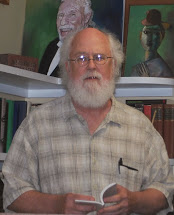 Poet, professor, and publisher, Dr. Graham Everett is the founding editor of Street Magazine and Street Press. He has worked as poet-in-residence at New York area schools, prisons, and arts councils from 1974 to 1986. Dr. Everett served as the interim director of the Poetry Center at the State University of New York at Stony Brook, and was a faculty member in the General Studies Program at Adelphi University.
Poet, professor, and publisher, Dr. Graham Everett is the founding editor of Street Magazine and Street Press. He has worked as poet-in-residence at New York area schools, prisons, and arts councils from 1974 to 1986. Dr. Everett served as the interim director of the Poetry Center at the State University of New York at Stony Brook, and was a faculty member in the General Studies Program at Adelphi University.
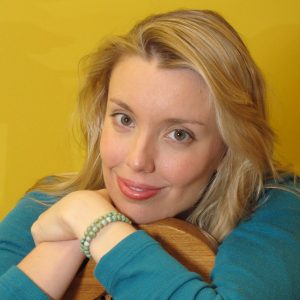 Annabelle Moseley is the author of the full-length poetry collection, The Clock of the Long Now, published in 2012 by David Robert Books and honored as one of four books featured on the 2012 First Books Panel at the West Chester Poetry Conference. Moseley has seven published chapbooks of poetry, including her newest, The Divine Tour (Finishing Line Press, 2012), The Fish Has Swallowed Earth (Aldrich Publishing, 2012), A Field Guide to the Muses (Finishing Line Press, 2009), a young adult fantasy novel, and a collection of children’s poetry. The first Walt Whitman Birthplace Writer-in-Residence, 2009–2010, Moseley is also founder and editor of String Poet, an online literary journal of poetry and the arts, and the host of The New York Times-featured String Poet Studio Series at the Long Island Violin Shop. She is founder of the national String Poet Prize. Moseley is a Lecturer at St. Joseph’s College and teaches poetry workshops at the Walt Whitman Birthplace and other cultural centers in the New York / Long Island area. A 2012 Pushcart Prize nominee, Moseley has published hundreds of poems internationally in such journals as Oprah.com, The Texas Review, The Seventh Quarry (Wales), The Lyric, Mezzo Cammin, and Umbrella, among others. Her first three chapbooks of poetry, published from 2005 to 2008 include: The Moon is a Lemon (Birnham Wood), Artifacts of Sound (Street Press), and Still Life (Street Press). Annabelle Moseley’s chapbook, First and Last Things, is a shared collection with the Welsh poet J. C. Evans, published jointly in New York and Wales by Cross-Cultural Communications. Moseley won first place in the 2008 Writer’s Digest Poetry Contest and a 2008 Amy Award from Poets & Writers. In April 2011, her poem “Breakable,” was chosen by O, The Oprah Magazine as one of the twelve poems selected from thousands to be featured on Oprah.com.
Annabelle Moseley is the author of the full-length poetry collection, The Clock of the Long Now, published in 2012 by David Robert Books and honored as one of four books featured on the 2012 First Books Panel at the West Chester Poetry Conference. Moseley has seven published chapbooks of poetry, including her newest, The Divine Tour (Finishing Line Press, 2012), The Fish Has Swallowed Earth (Aldrich Publishing, 2012), A Field Guide to the Muses (Finishing Line Press, 2009), a young adult fantasy novel, and a collection of children’s poetry. The first Walt Whitman Birthplace Writer-in-Residence, 2009–2010, Moseley is also founder and editor of String Poet, an online literary journal of poetry and the arts, and the host of The New York Times-featured String Poet Studio Series at the Long Island Violin Shop. She is founder of the national String Poet Prize. Moseley is a Lecturer at St. Joseph’s College and teaches poetry workshops at the Walt Whitman Birthplace and other cultural centers in the New York / Long Island area. A 2012 Pushcart Prize nominee, Moseley has published hundreds of poems internationally in such journals as Oprah.com, The Texas Review, The Seventh Quarry (Wales), The Lyric, Mezzo Cammin, and Umbrella, among others. Her first three chapbooks of poetry, published from 2005 to 2008 include: The Moon is a Lemon (Birnham Wood), Artifacts of Sound (Street Press), and Still Life (Street Press). Annabelle Moseley’s chapbook, First and Last Things, is a shared collection with the Welsh poet J. C. Evans, published jointly in New York and Wales by Cross-Cultural Communications. Moseley won first place in the 2008 Writer’s Digest Poetry Contest and a 2008 Amy Award from Poets & Writers. In April 2011, her poem “Breakable,” was chosen by O, The Oprah Magazine as one of the twelve poems selected from thousands to be featured on Oprah.com.
Annabelle Moseley was born on the North Shore of Long Island, where she currently resides with her husband. The beauty of Whitman’s Paumanok has influenced her writing, and much of her work is inspired by nature and human relationships. Among the themes of her writing is the tension between beauty and loss. She became an internationally published poet while still an undergraduate at Fairfield University in Connecticut. She graduated summa cum laude with a BA in English and was elected to Phi Beta Kappa. Upon leaving Fairfield University she took with her all three of the available prizes in poetry. The next year she received a first place Poetry Center Prize in Poetry from the C.W. Post Campus of Long Island University. She holds an MFA in Poetry and an MA in Religious Studies, with a concentration and thesis on the medieval pilgrimage. She served for three years (2005–2008) as Poet-in-Residence at The Stevenson Academy of Fine Arts in Oyster Bay, New York.
Fran Castan, a native of Brooklyn, New York, moved to Hong Kong with her six-month-old daughter and her first husband, Sam Castan, when he became Asia Bureau Chief of Look Magazine. His assignment was the culmination of three years of covering the war in Vietnam and writing many award-winning articles. However, not long after moving his family to the far east, Sam Castan was killed in the highlands of Vietnam. In the time since, Fran Castan worked as an editorial assistant at The New Yorker, an editor at Scholastic Magazines and as editorial director of Learning Corporation, the former educational subsidiary of Columbia Pictures.
As a freelancer, her work appeared in The New York Times, The New York Times Magazine, Education Digest and on WNET. For 25 years, she taught writing and literature at The School of Visual Arts in Manhattan, a four-year college and graduate school. Fran Castan began writing poetry at the age of 40 and earned an M.A. in creative writing at New York University. While there, she won a teaching fellowship, a fellowship to the MacDowell Colony, a prize given by the Academy of American Poets and N.Y.U. and The Lucille Medwick Award from the Poetry Society of America. Her poems have appeared in dozens of magazines and anthologies. Among the magazines are Poetry, Heliotrope, and Ms. Among the anthologies are Broken Land: Poems of Brooklyn (N.Y.U. Press); Seasons of Women (Norton); From Both Sides Now: The Vietnam War, and Its Aftermath in Poetry (Scribner/Simon & Schuster); On Prejudice: A Global Perspective (Anchor/Doubleday) and The Light of City and Sea (Street Press). Fran Castan has read at The Geraldine Dodge Poetry Festival and The Seattle Poetry Festival. She has appeared at colleges, bookstores and libraries in New York, California, Washington State, Maryland, New Jersey, Pennsylvania, Vermont, Virginia, Maine and Connecticut. She continues to give workshops and readings countrywide. She just received a 2008 Pushcart Prize nomination, her fifth. Fran and her husband, the artist Lewis Zacks, live in Amagansett, New York, where they are frequently visited and inspired by their five grandchildren.
Mario Susko, a witness and survivor of the war in Bosnia, received his M.A. and Ph.D. from SUNY Stony Brook in the 1970s and moved back to the US in 1993. A three-time Fulbright scholar, he has taught at the University of Sarajevo, but has lived more than half of the past 36 years in the US. He is currently an Associate Professor in the English Department at Nassau Community College in Garden City, NY.
Mario Susko has published 75 books, 25 of which are volumes of his own poems. He has also edited and translated several anthologies and is the recipient of many awards, including the 1997 and 2006 Nassau Review Poetry Award, the 1998 Premio Internazionale di {Poesia e Letteratura “NuoveLettere” (Naples, Italy), the 2000 Tin Ujevic Award for Versus Exsul for the best book of poems published in Croatia in 1999, and the 2003 SUNY Chancellor’s Award for Excellence in Scholarship and Creative Activities. His poem “Conversion,” published and nominated by “Dream Catcher” (UK), was short-listed for the 2004 Forward Poetry Prize. “The Paumanok Review”, “Nassau Review”, and “Branches Quarterly” have nominated his poems for the Pushcart Prize, and “The Interpreter’s House” (UK) and “Dream Catcher” for the 2006 Forward Prize in the best single poem category.
Mario Susko is also known as an editor and a translator, having translated novels by Saul Bellow, William Styron, Bernard Malamud and James Baldwin. He has also edited and translated stories by Donald Barthelme, and poems by Theodore Roethke and E.E. Cummings, among others. His most recent books include the anthology of modern Jewish-American short stories “A Declaration of Being” (Meandar, 2006), which he co-edited with Myron Schwartzman and translated into Croatian; a book of selected and new poems, “Life Revisited” (Allahabad, India, 2006); and his 25th book of poems, the Croatian edition of “Eternity on Hold” (Meandar, 2006), originally released in English by Turtle Point Press in 2005. His new poetry collection, “Closing Time,” will be released in April 2008 by Harbor Mountain Press and will be available wherever HMP’s books are sold. (Information taken from UniversityOfPoetry.org)
Pramila Venkateswaran grew up in Bombay. She earned a BA at Sophia College in Bombay, an MA at Bombay University, and a PhD at George Washington University. The poet laureate of Suffolk County, Long Island, is author of Thirtha (Yuganta Press, 2002), Behind Dark Waters (Plain View Press, 2008), Draw Me Inmost (Stockport Flats, 2009), and Trace (Finishing Line Press, 2011).
Her poems have been published widely in the United States, Canada, and India in journals such as Prairie Schooner, Ariel: A Review of International English Literature, Atlanta Review, and Kavya Bharati, and in award-winning anthologies, such as Indivisible: An Anthology of South Asian American Poetry.
She has won first prizes in national poetry competitions such as Two Review and String Poetry, and was a finalist for the Allan Ginsberg Poetry Prize and in the Finishing Line Chapbook poetry contest.
She has performed her poems internationally, most recently at the Geraldine R. Dodge Poetry Festival.
Her essays and reviews have appeared in The Writer’s Chronicle, The Women’s Studies Quarterly, Socialism and Democracy, Journal of Postcolonial Writing, and in anthologies of literature, culture and politics.
She is Professor of English at Nassau Community College (SUNY), is actively involved in giving workshops and readings across Long Island and beyond, and is the co-founder of Euterpe, the poetry venue in Emma Clark Memorial Library.
Gladys Henderson’s poems have been published in Kaleidoscope, Oberon, Long Island Dreams, For Love Of Precious Beast, Midwestern University Quarterly, Long Island Sounds, The Light of City and Sea, Robert Frost Participant Anthologies, Performance Poets Anthologies, and Lyrismos. In addition, her poems have been selected to appear in Songs Of Seasoned Women, PAUMANOK: Poetry and Pictures of Long Island and Primal Sanities. Her first book of poetry, Eclipse Of Heavenwill be published by Finishing Line Press and will be available in 2008.
An award winning poet, in 2004 she was awarded first prize in the Live Poets, Mid-Island YJCC, and Ronkonkoma Productions poetry competitions. In 2005 she won first place in the Farmingdale Poetry Group and Performance Poetry competitions. For the year 2006, she received first place in the Ronkonkoma Productions competition and most recently she was announced as a finalist for the Paumanok Poetry Award 2006.
She runs poetry workshops for Live Poets, based in Islip and the Poets Circle at the Graphic Eye in Port Washington and co-hosts a poetry reading venue at the Cool Beanz coffee house in Saint James, New York.
Patti Tana grew up on the Hudson River in Peekskill, New York, and since 1968 she has made her home on Long Island. She is currently the professor Emerita of English at Nassau Community College (SUNY) and the Associate Editor of the Long Island Quarterly since it was founded in 1990. In 2009, Patti was selected as “Poet Of The Year” by the Walt Whitman Birthplace Association.
Throughout her career Patti wrote and published several different books on poetry, including: How Odd This Ritual of Harmony (1981,) Ask the Dreamer Where Night Begins: Poems & Postscripts (1986,) The River (1990,) Wetlands (1993,) When the Night Falls Short of the Dream (1998,) Make Your Way Across This Bridge: New & Selected Writings (2003,) This is Why You Flew Ten Thousand Miles (2006,) Any Given Day(2011.) Additionally Patti is the editor of an anthology of 119 poems by 63 different poets.
All I Can Gather & Give, Patti Tana’s new collection of seventy-five poems, was released this autumn by JB Stillwater / Casa de Snapdragon Publishing. In a voice intimate and accessible, the poems affirm a life that is passionately lived. The poet thanks her sister Walt Whitman Birthplace Association Poets of the Year in a note of Gratitude and in the Acknowledgments: Gladys L. Henderson and Pramila Venkateswaran for helping her “shape these poems,” and Annabelle Mosley for first publishing some of the poems.
Susan Astor has worked as a poet in residence in the public schools of Nassau, Suffolk, and Westchester counties for over 25 years, teaching students of all ages and abilities to craft their own poems. In recent years, she has taught in Carle Place, Cold Spring Harbor, Garden City, Mineola, Sachem, Smithtown, Rocky Point, Southold, and West Babylon. She also conducts poetry workshops in local libraries, civic centers, and in her home, for adults as well as children. Her poetry has appeared in a myriad of magazines and journals, including The Paris Review, Partisan Review, Confrontation, Poet Lore, The George Washington Review, Black Warrior Review, Kansas Quarterly, and West Hills Review, and has been included in many anthologies of modern verse. She has won several poetry prizes, including the CW Post Poet in the Community Award, which she received on two separate occasions.
Vince Clemente, American poet, biographer, critic, editor, and professor of English was born on April 28, 1932. The son of an Italian-American fisherman and seamstress from New York City, Clemente was interested and inspired by local surroundings and artists – a subject matter of much of his poetry and scholarship. He received a BA in English (Honors) from St. Francis College of Brooklyn in 1953 and served in the U.S. Army’s 716th Military Police Battalion from 1953 to 1955 Clemente earned his Master’s Degree in English (Honors) from Columbia University and continued his graduate studies at Columbia from 1959 to 1960.
Clemente has written nine volumes of poetry: Under a Baleful Star, A Garland for Margaret Fuller(2006), Sweeter Than Vivaldi (2002), Watergaw Along the Thames (1999), A Place for Lost Children (1997), This Shining Place (1992), Girl in the Yellow Caboose (1991), Broadbill Off Conscience Bay (1982), Songs from Puccini (1978), and Snow Owl Above Stony Brook Harbor (1977). His poems and other writings have appeared in journals and newspapers including The New York Times, Clemente currently is English Professor Emeritus at SUNY Stony Brook, a lecturer and journalist, as well as author and poet. He is presently Consulting Editor, America, for The Seventh Quarry: Swansea [Wales] Poetry Magazine and a columnist for The Sag Harbor Express. From 1996–1998 he was a lecturer and writer at Richmond-On-Thames, England, and was visiting writer to a number of American institutions including CW Post College, Hofstra University, Dowling College, and several SUNY schools. Clemente has been the recipient of many awards and honors, including grants from the New York State Council of the Arts and the National Endowment for the Arts. He is recipient of the first North Sea Scene Poetry Recognition Award.
The Vince Clemente Papers consist of published and unpublished manuscripts, correspondence (including John Ciardi, John Hall Wheelock, and William Heyen) and printed ephemera. Materials date primarily from the 1980s forward, although there is some earlier correspondence. Materials are organized over time as acquired beginning in 2000 and by subsequent updated acquisitions from Vince Clemente. An alphabetical index of Clemente’s correspondents is also available.
Charles Monroe Fishman was born on July 10th, 1942, in Oceanside, Long Island, the oldest of two children born to Morris (Murray) Fishman, Forman at Superior Printing Ink Company on Lafayette Street in New York City, and Naomi (Toby) Adès, a homemaker. Two years after Fishman was born, the family moved to Wheeler Avenue in the South Bronx, where it was joined by Anita, Murray’s daughter from a previous marriage. Anita, 12 years older than the future poet and 15 years older than Harriet, their younger sister, often acted as a baby sitter and, at times, as a second mother. In 1951, the family moved to Wantagh Long Island, where it resided for many years.
In the middle of his sophomore year at Levittown Memorial High School, Fishman began writing poetry out of sheer boredom and a volatile mix of anger, intellectual and emotional hunger, and an intense need for the comforts of language and beauty. His junior English teacher, Abraham Blinderman, read some of his early work and, in class one day, announced “Charlie is a poet.” Blinderman also sent those early poems to Poetry Magazine and received a personal rejection, which Fishman still has in a file somewhere. As a senior at Memorial, he read Kerouac’s On the Road and realized that he needed to squeeze himself out of the dusty coffin that school had become for him and, after graduating, left a part-time summer job finishing turn-tables for stereophonic record players to hitchhike across the country with his school friend, Harry Iceland. The following year, he hitchhiked the country again, this time solo, and stayed for a month with Anita’s family in Renton, Washington, while he wrote at night and floated, during long summer days, from one exhibit to another at the Seattle World’s Fair.
Fishman met his soulmate, Ellen Marcie Haselkorn, at a fraternity dance at Hofstra University (then Hofstra College), on his return from Renton to Long Island. They were dancing fools and very young and their first marriage, in August 1964, fell apart after a year and a half. By then, they were both teaching, and he decided to hitchhike once more — this time across Europe during his summer break. When he returned to the States before the start of the new school year, he called Ellen and they began seeing each other again. Their second marriage, in June 1967, proved to be another rollercoaster, but it produced two amazing daughters and countless memories that will not be forgotten. September 20, 2012 marked 50 years from the time they met. Every personal, national, and worldwide catastrophe, exaltation, and transformation that has happened in-between those dates have joined forces to make Fishman the poet, editor, scholar, and teacher he has become.
In May 1999, after Naomi’s death, Fishman replaced his given middle name with her maiden name, to honor her memory.
Claire Nicolas White, born June 18,1925, in Groet, Netherlands, died May 26 in St. James. A woman of vast and varied talents, she was a poet, writer and teacher of ballet, French and writing. Daughter of stained-glass painter Joep Nicolas and sculptor Suzanne Nys, Claire spent her early childhood in the Netherlands and a convent school in France. When she was 14, her parents fled the Nazi menace. Her father had a commission to paint a mural in Rockefeller Center, New York, where the family felt at home in a European community of exiled artists and writers. Claire and her younger sister, Sylvia, attended the Lycée Français with the children and grandchildren of other refugees.
When she’d arrived in New York, Claire spoke Dutch and French. By the time she graduated from Smith College, she’d fallen in love with English. In the poem, “Marriage II,” she wrote:
But English I wed for better or worse,
my reality, my daily companion.
In 1946, Claire, with her mother, sister and fiancé, drove to California to visit her mother’s sister, Maria, and her husband, writer Aldous Huxley. In a 2017 interview, Claire said that her famous uncle had encouraged her to follow her chosen path.
After graduating from Smith College, she married Robert White, renowned sculptor and a grandson of the architect Stanford White. Speaking of the primacy of art in their relationship, Claire said, in that same interview, “Life is chaos; art is necessary to organize it.”
Claire and Bobby had four children. Their oldest, Sebastian, became a physicist; Stephanie, a dancer; and Christian, a painter. Claire’s youngest child, Natalie, died in a car accident when she was only 17. Claire also had six grandchildren and two great-grandchildren. Until her last days, her close family, including many nieces and nephews, was a continual source of joy. She took pride in the way Sylvia and her son, Diego, have carried on the stained-glass legacy of the Nicolas family.
Because of family connections and her schooling, Claire was accustomed to meeting famous people. She wrote opera libretti for Vittorio Rieti, the composer, a great friend and the father of the artist Fabio Rieti, her Lycée classmate. Cartier-Bresson photographed her as a young woman. She took silent walks with the Indian writer and philosopher, Krishnamurti, who taught her how to concentrate on each step. Through Rieti, she met Igor Stravinsky and introduced him to Aldous Huxley. Through Stravinsky, she met the great choreographer, George Balanchine. When Bobby won a Prix de Rome, the couple befriended the writer William Styron and his wife in Italy.
And yet Claire was not drawn to the limelight. She was fond of quoting the line in Emily Dickinson, “I’m Nobody! Who are you?” Putting down roots in St. James, she created an astonishing legacy, producing poems, libretti, plays, essays, memoirs, novels, art criticism (Art News, Newsday) and translations of Dutch and French literature. She mentored students of all ages at the Walt Whitman birthplace, in schools all over Long Island and in nursing homes. At Taproot Workshops & Journals, a nonprofit that encourages senior citizens to write in all genres, Claire was, according to its executive director, Enid Graf (in a letter to The New York Times,1995), “One of the organization’s finest teachers.” Claire was also the first editor of Oberon Poetry Magazine, founded in 2002 and still published by the Oberon Foundation.
She wrote into her 90s, both poetry and prose. Writer Orel Protopopescu, like many others in Claire’s orbit, considered her a mentor as well as a friend: “Until late last year, she was well enough to meet with our writing group weekly and would surprise us with unexpected turns of phrase, and a wry wit that was inimitably hers. Poems came to her with the regularity of dreams. There is a short poem called “The Tower” in which Claire describes an old wooden water tower close to her house. Its concluding lines encapsulate her philosophy of life:”
Raymond R. Patterson was born on December 14th, 1929. . He was an African American poet, writer, and professor.
Born in Harlem, he was a graduate of the New York City Public School System. Patterson received his BA in Political Science from Lincoln University in Pennsylvania, where he was class poet, and won the Boretone Mountain Poetry Award for best poem written by an undergraduate. He received his MA in English from NYU. A prolific poet whose work was widely anthologized, Patterson was author of “26 Ways of Looking at a Black Man and Other Poems” published in 1969, and “Elemental Blues,” published in 1983.
He also wrote two opera librettos and an unpublished book-length poem on the life of Phillis Wheatley. Patterson read his works widely, from local venues to the Library of Congress in Washington, D.C., and at the 60th Birthday Celebration of Chinua Achebe at the University of Nigeria. He collaborated with his wife in the creation of Black Poets Reading, a non-profit speakers’ bureau; he represented the U.Ss at the Struga Festival in Macedonia. He was an Umbra Poet who served on the executive boards of the Poetry Society of America, the PEN American Center, and the Walt Whitman Birthplace.
Patterson was also a well-known figure on the Long Island poetry landscape, a dignified voice for poetry who served for many years as a mentor to many individual writers regionally. His poetry also appeared in publications like Transatlantic Review, Ohio Review and Beloit Poetry Journal, as well as in many anthologies including “The Poetry of the Negro,” “New Black Voices,” “The Norton Introduction to Literature,” and “The Best American Poetry of 1996.”
Patterson joined the New York City College faculty in 1968 and was founder of its Langston Hughes Festival, which he directed from 1973 to 1993. Patterson was on the board of the Walt Whitman Birthplace for many years.
Ray Patterson died on April 5, 2001, at the age of 71. He is survived by a daughter, Ama Patterson, a sister, Carol Patterson Lewis of Plainfield, N.J., and two grandchildren.
Born in Sweden on February 5, 1939, 30 kilometers north of the arctic circle, Siv Cedering immigrated to San Francisco at the age of fourteen and became an American citizen five years later.
She is the author of eighteen books of poetry and fiction, most recently Vixen (2007, Pushcart Press), and Letters from an Observatory: New and Selected Poems, 1973-1998 (1998). She has written for both adults and children, in both English and Swedish, and is also a prolific translator, composer, and visual artist.
Her paintings have appeared in a number of one-woman shows; and she has created poetry sculptures, large outdoor installations that include a poem or a poetic fragment. In her collection Cup of Cold Water (1973), Cedering paired her poems with her photographs. She also has illustrated several of her books, including The Blue Horse and Other Night Poems (1978), Polis, polis, potatisgris (1985), and Grisen far till Paris (1987).
Usually written in the first person, Cedering’s poems often deal with the erotic and the sensuous realm. In her recent work, she has mixed elements of science and myth. Published in many anthologies and journals, her poems have appeared in Partisan Review, The New Republic, and The Paris Review.
Her many grants and awards include the William Marion Reedy Award from the Poetry Society of America, a Pushcart Prize, and an Emily Dickinson Award. She died in her home in Amagansett, New York, on November 17, 2007.
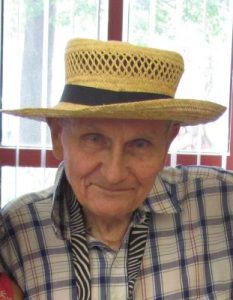
- He called poetry “An environmental force”
- In later years, he focused less on nature, Pete Seeger; Marecello Lucero- Jeffrey Conroy; John Muir; Oilman George Bush’s Hollow Eye Sockets
- Virginia and Max had a Pekenese dog named Calle Lora. When she disappeared, Max and Virginia panicked until they found her
- Max’s idea of a gourmet lunch was a grilled cheese or tuna fish sandwich and bowl of tomato soup
- On Halloween Night, trick or theaters got candy AND a Max poem
- Max wrote many memoir poems, grandfather, daughters, Virginia
- When nominated for the first Poet Laureate of Suffolk County, he was snubbed for his criticism of national politics. He was crowned by the newly formed Nassau County Poet Laureate Committee; 2007
- “I’m in poetry for the money.” He often quipped.
- Many years after he retired, he was still teaching English…”Anyone Can Write A Poem” He made beginners feel comfortable and encouraged them. He used a humming sound of approval.
- He always had a spiral notebook in his pack along with a Peterson Bird Guide
- He made frequent trips to Staples to copy handouts for classes and workshops. He invented simple techniques such as “sneak ins” (words that don’t belong)
- “Reputation Enhancement” was a favorite phrase, otherwise known as self-promotion. He had a wonderful sense of humor
- In his study, which was inundated with 5 feet of water from hurricane Sandy, he had at least a dozen briefcases filled with papers
- His study, at the rear of their 1920 cottage, had several standing book shelves jammed with loose leaf folders and books. The isles were narrow.
- He likes to call facts “details”
- He conducted taproot Classes for many years
- Before a workshop, he’d spend hours researching poets and techniques, and example poems
- May 11, 2001, Max and I sat outside on the front porch. “It’s a wave day.” He announced. Many migrating birds that crossed from Sandy Point, New Jersey to Freeport adorned the trees. “There’s a Parula warbler.” He calls
- He often visited daughter Dede in California and Emily in Virginia. Virginia and max visited Holy Cross Anglican Monastery in West Park, and then toured the John Burroughs Nature sanctuary at Slabsides
- In his English classes, when he assigned students to write, if he saw one staring out the window he order “Just write.”
- I visited for a week while working on a fishing boat on the Freeport Canal. Max let me stay the week. I slept in the attic. Late at night, I’d come down to use the bathroom and I’d see Max sitting at the dining room table, reading the paper and cutting out articles to tape in his loose leafs. In early mornings with coffee, we’d talk poetry. He was reading Thomas Merton’s poems – good for discussion
- A sign on their master bedroom door “Male supremacy is a fallacy”
- Max preferred Anglican over Episcopal. A good Anglican has a good martini
- Max wore short-sleeved shirts almost all the time
- Max’s definition of tradition…”Something you can’t get rid of.”
- He took theology classes at the Cathedral of the Incarnation
- “poetry isn’t about meaning, it’s about language” an oft used quote
- In a November 26, 1997 letter: “There is so much I have to write you especially about spirituality and the earth. It is overwhelming
- His sleep habits were much like Thomas Edison’s – catnaps
- Max and were friends for at least three decades. He was not afraid to ask for help. He helped me immeasurably. I helped him with the nature part. I assigned myself to be a liaison between Nature and Max.
- After a positive critique, he’d offer a frank assessment Letter November 21, 1989: “There is a major problem with introductory lines of paragraphs.. They are rhetorical and Bland. Cut them and go straight into the subject.”
- Max was a man of love for his family and everyone he met. I stood on his shoulders, now I’m ready to have someone stand on mine
- Thanks Max for a friendship I will cherish all the days of my life.
Norbert Krapf was born in 1943 in Jasper, Indiana, a German community. He graduated from Jasper High School and received a B.A. in English from St. Joseph’s College, Rensselaer, IN. He received his M.A. in English from the University of Notre Dameand also his Ph.D. in English and American Literature, with a concentration in American Poetry. He taught at the C. W. Post Campus of Long Island University 1970-2004, where he is now emeritus Professor of English, was Poet Laureate 2003-2007, and directed the C. W. Post Poetry Center. He twice served in Germany as a Senior Fulbright Professor of American Poetry, at the Universities of Freiburg and Erlangen-Nuremberg. He was also a U.S. Exchange Teacher at West Oxon Technical College, England.
In June of 2008, he was appointed to a two-year term as Indiana Poet Laureate, in which capacity he continued his efforts to reunite poetry and music, brought Indiana poetry to TV and radio, give readings and talks in libraries and other venues, and visited schools to share with students his enthusiasm for reading and writing poetry and prose memoir. He also emphasized collaborations between poets and artists.
On Aug. 13, 2012, Indiana Univ. Pr. released Norbert Krapf’s ninth full-length collection, his 24th book, Songs in Sepia and Black and White, a collection of 101 poems with 58 black and white photos by Richard Fields, formerly of the Indiana Dept. of Natural Resources. Included is a section of 26 poems about music and musicians, “Practically with the Band.” Fifteen of the poems are about singer-songwriter Bob Dylan, a model for combining poetry and music. Other musicians to whom Krapf pays tribute are Woody and Arlo Guthrie, Leadbelly, John Lennon, Indianapolis bluesman Yank Rachell, and other Indiana musicians.
Norbert Krapf’s papers, including his literary correspondence and manuscripts, are housed mainly in the Rush Rhees Library, Univ. of Rochester (see a 27-page index), but also in the special collections at IUPUI, Univ. of California San Diego, Stanford Univ., and the Univ. of New Hampshire. The Indiana Historical Society has a collection of audio- and videocassettes of his radio and TV and other readings and interviews that are being converted to CD, and the Dubois County Museum holds his collection of family history materials and documents, including memorabilia from grade school, Boy Scouts, high school, and college.
